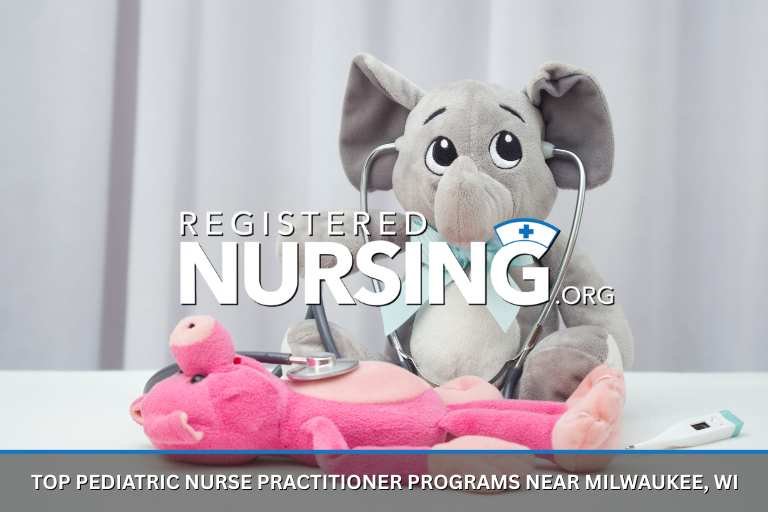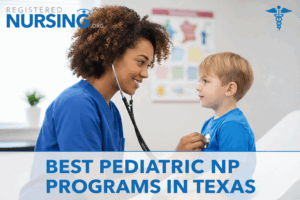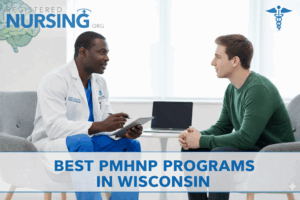Top Pediatric Nurse Practitioner Programs Near Milwaukee, WI
- Top Pediatric Nurse Practitioner Programs Near Milwaukee, WI
- Why Choose a PNP Program in the Milwaukee Region?
- Key Features of Top PNP Programs
- Admission Requirements and Prerequisites
- Clinical Experience in Pediatric Settings
- Career Outlook and Certification Pathways
- Tips for Choosing the Right Program
- Sources
- Latest Articles & Guides

Milwaukee’s dynamic healthcare landscape is evolving alongside a rising demand for advanced practice nurses. In particular, Pediatric Nurse Practitioners (PNPs) are stepping into crucial roles within Wisconsin’s hospital systems, pediatric clinics, and school-based health programs. As of 2024, the U.S. Bureau of Labor Statistics (BLS) projects a 38% growth in nurse practitioner roles nationwide between 2022 and 2032, far outpacing the average for all occupations. This creates a unique opportunity for nurses in the Milwaukee region to specialize in pediatric care through rigorous academic and clinical training.
The city's strong academic-medical infrastructure, anchored by respected institutions like Children's Wisconsin and the Medical College of Wisconsin, positions Milwaukee as a hub for pediatric-focused advanced nursing education. PNP programs in and around the city offer tailored options for working nurses, recent BSN graduates, and those seeking career changes, all with access to hands-on learning in community and hospital settings. The region's healthcare system is built on collaboration, research, and innovation, offering a vibrant backdrop for future pediatric nurse practitioners to gain the training necessary to meet evolving care demands.
Top Pediatric Nurse Practitioner Programs Near Milwaukee, WI
Marquette University
Milwaukee, WI - Private 4-year - marquette.edu
BSN to MSN - Pediatric Primary Care Nurse Practitioner
Online & Campus Based - Visit Website
Marquette University's Pediatric Primary Care Nurse Practitioner program delivers advanced nursing education focused on comprehensive child healthcare. Students develop sophisticated clinical skills for independently managing pediatric patient care across various developmental stages. The hybrid program emphasizes holistic healthcare delivery, preparing nurses to address complex health challenges in primary care settings. Graduates gain expertise in advanced clinical assessment, diagnostic reasoning, and patient management techniques. The curriculum integrates rigorous academic training with practical experiences, enabling students to become highly skilled pediatric healthcare professionals capable of providing nuanced, patient-centered care.
- Advanced pediatric healthcare practice
- Independent patient care skills
- Comprehensive clinical training
- Primary care specialization
- Holistic child health approach
BSN to MSN - Pediatric Acute Care Nurse Practitioner
Online & Campus Based - Visit Website
Marquette University's Pediatric Acute Care Nurse Practitioner program equips BSN-prepared nurses with specialized training in managing critically ill children. Designed as a hybrid format, the program demands PALS certification and preferably one year of acute care pediatric experience. Students develop advanced clinical skills for navigating complex medical environments, focusing on comprehensive patient assessment and critical decision-making. The curriculum emphasizes hands-on learning, preparing graduates to handle sophisticated pediatric healthcare challenges across diverse acute care settings. Prospective students benefit from intensive clinical practicum experiences that transform theoretical knowledge into practical expertise.
- Hybrid program format
- Advanced pediatric clinical training
- PALS certification required
- One year acute care experience recommended
- BSN prerequisite
BSN to MSN - Dual Pediatric Primary Care and Acute Care Nurse Practitioner
Online & Campus Based - Visit Website
Marquette University's Dual Pediatric Primary Care and Acute Care Nurse Practitioner program offers an innovative pathway for nurses seeking comprehensive pediatric specialization. Students complete 1000 total clinical hours, including 500 hours in primary and acute care settings, with training opportunities at Children's Hospital of Wisconsin. The flexible part-time curriculum accommodates working professionals while preparing graduates for dual certification. With two years of pediatric RN experience required and a minimum 3.0 undergraduate GPA, the program cultivates versatile healthcare professionals capable of addressing children's complex acute and chronic health needs across multiple clinical environments.
- Hybrid program format
- 250 hours clinical residency
- 1000 total clinical hours
- Multiple degree tracks
- $1,400 per credit tuition
- Two years pediatric RN experience required
- High-fidelity simulation labs
- Minimum 3.0 undergraduate GPA
- Wisconsin/eNLC license needed
- Part-time study option
Why Choose a PNP Program in the Milwaukee Region?
Milwaukee's vibrant healthcare system, led by institutions like Children's Wisconsin and Froedtert Health, provides rich clinical settings for pediatric-focused training. The region also offers:
- Diverse clinical opportunities in urban, suburban, and rural pediatric populations.
- Access to top-ranked hospitals, consistently rated among the best children’s hospitals in the Midwest.
- Strong academic networks through local universities and regional partnerships with Wisconsin-based health systems.
- Population diversity that supports training across different cultural and socioeconomic groups.
These factors help PNP students develop a nuanced understanding of pediatric health in varied community settings. With a growing emphasis on preventive care and early childhood wellness, Milwaukee's programs are well-positioned to train the next generation of specialists.
Key Features of Top PNP Programs
Evaluating Pediatric Nurse Practitioner programs requires attention to specific academic and clinical qualities. Leading programs in the Milwaukee area are characterized by:
- CCNE or ACEN Accreditation ensuring academic credibility and licensure eligibility.
- Primary Care or Acute Care PNP Track Options depending on the desired practice setting.
- Clinical placement support with access to pediatric sites within and near Milwaukee.
- Faculty with pediatric clinical expertise and strong student support services.
Several programs also build in leadership development and interprofessional collaboration, preparing graduates to contribute meaningfully across care teams. Many institutions now offer coursework in telehealth, pediatric behavioral health, and health policy, enhancing graduates' readiness for modern healthcare delivery models.
Admission Requirements and Prerequisites
Understanding what is required to apply to a PNP program ensures a smoother admissions process. While each institution may differ slightly, most programs in the Milwaukee area expect applicants to meet the following:
- A BSN from an accredited program (or entry through an RN-to-MSN pathway)
- Active RN licensure (WI licensure or eligibility to obtain)
- A minimum GPA of 3.0 on prior nursing coursework
- Letters of recommendation, typically from academic or clinical supervisors
- Personal statement detailing pediatric interest and career goals
- Clinical nursing experience, often preferred in pediatric or family health settings
Additional requirements may include immunization records, background checks, and technical skill assessments. Some programs have waived GRE requirements in favor of holistic application reviews. International applicants may be required to submit TOEFL scores or other proof of English proficiency.
Applicants are encouraged to review each program's prerequisites well in advance of the application deadline. Schools often offer information sessions, advising appointments, or bridge coursework to help applicants strengthen their candidacy.
Clinical Experience in Pediatric Settings
Clinical rotations form the foundation of pediatric nurse practitioner education. Milwaukee offers access to high-impact sites for students, including:
| Clinical Site | Specialty Focus | Notable Features |
| Children's Wisconsin | Acute and primary pediatric care | Level I Pediatric Trauma Center with outpatient clinics |
| Sixteenth Street Community Health Centers | Community and underserved populations | Culturally responsive care models |
| Aurora Health Care | Integrated pediatric services | Includes school-based and family-focused clinics |
These hands-on experiences allow students to develop diagnostic reasoning, communication skills, and familiarity with pediatric treatment protocols. Rotations may include specialty areas such as pediatric cardiology, oncology, and behavioral health. Exposure to interdisciplinary care teams, including social workers, child life specialists, and nutritionists, further enriches the learning process.
Career Outlook and Certification Pathways
Graduates of Pediatric Nurse Practitioner programs are eligible to pursue board certification through nationally recognized bodies:
- PNCB (Pediatric Nursing Certification Board) for primary care
- ANCC (American Nurses Credentialing Center) for select programs
According to recent BLS data, the median annual salary for nurse practitioners in Wisconsin is approximately $118,000. Pediatric NPs are in particular demand in Milwaukee's urban clinics, school health programs, and specialty practices. With many pediatricians retiring and fewer entering the workforce, PNPs are helping fill critical gaps in pediatric care.
In addition to traditional practice settings, certified PNPs may find employment in community health initiatives, public health departments, telemedicine platforms, and research roles. Graduates are often involved in advocacy efforts around childhood immunizations, access to primary care, and pediatric mental health services.
Tips for Choosing the Right Program
Selecting the right PNP program involves aligning career goals with practical considerations. Prospective students should examine:
- Proximity to clinical sites and whether placements are coordinated by the program
- Graduation rates and board certification outcomes to gauge academic strength
- Course delivery format (online, hybrid, or in-person) and schedule flexibility
- Availability of faculty mentorship and student support resources
- Cost and financial aid availability, including scholarships or employer reimbursement
Attending webinars, reviewing syllabi, and speaking with alumni can offer clarity about a program's values and outcomes. Additionally, connecting with clinical preceptors or local pediatric professionals can provide valuable insights into how well-prepared graduates are for real-world practice.
For nurses returning to school after time away from academia, programs that offer refresher modules, writing support, and part-time pacing may ease the transition back into student life.
Sources
- Bureau of Labor Statistics – Nurse Practitioner Job Outlook
- Pediatric Nursing Certification Board (PNCB)
- American Association of Colleges of Nursing (AACN)
- Children’s Wisconsin
- Wisconsin Department of Health Services
- Commission on Collegiate Nursing Education (CCNE)
- Accreditation Commission for Education in Nursing (ACEN)
Latest Articles & Guides
One of the keys to success as a registered nurse is embracing lifelong learning. Our articles and guides address hot topics and current events in nursing, from education to career mobility and beyond. No matter where you are on your nursing journey, there’s an article to help you build your knowledge base.
Browse our latest articles, curated specifically for modern nurses.



